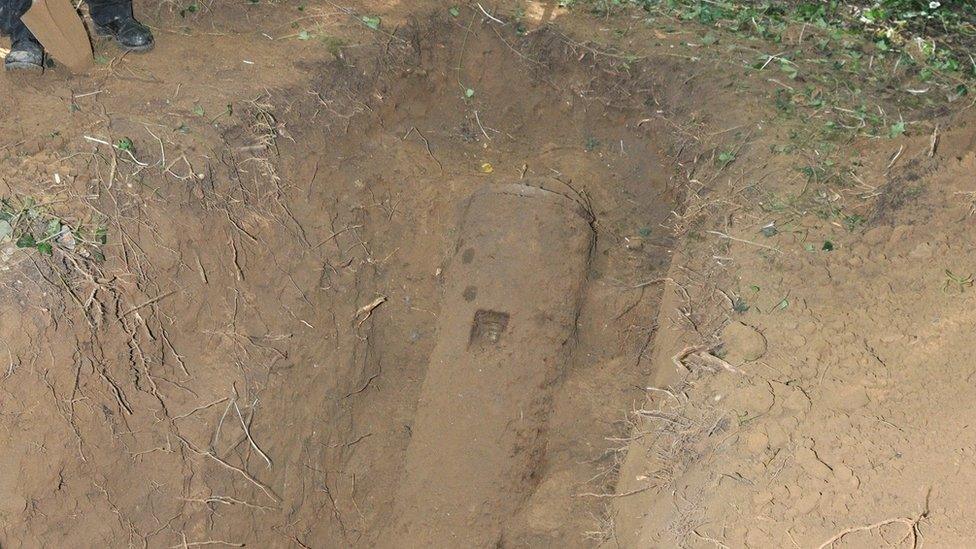Red Cross ship saved Channel Islanders from WW2 starvation
- Published
Model celebrates 70th anniversary of Red Cross parcels arriving in the Channel Islands
Christmas lunch for Channel Islanders in 1944 was a meagre affair and only the arrival of the Red Cross ship the SS Vega a few days later kept thousands alive.
The islands had been occupied by the German military since June 1940 and the Allied thrust through Europe had cut off supplies.
"Everyone was shouting Vega, Vega, you could hear it all over town, everybody was emotional, but gave it a rousing welcome," said Molly Bihet, who has written several books on the occupation.
"We were all crying, a lot of people have told me they thought that parcel meant more than Liberation Day."
John De Jersey, who had been imprisoned by the German authorities, said: "I actually saw the ship enter St Peter Port harbour from my cell window.
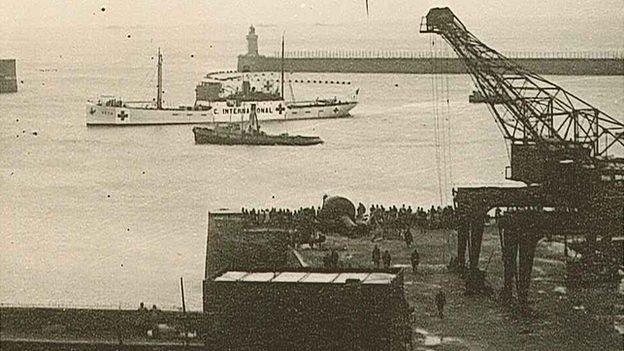
Islanders gathered along the seafront in St Peter Port to welcome the much needed supplies
"If it hadn't been for that wonderful ship there would have been a lot of people [who] would have died of starvation in Guernsey."
To mark the 70th anniversary of the arrival of the Vega and its vital role in bringing supplies, a group of model boat enthusiasts have completed a 6ft 8in by 1ft replica of the ship.

Occupation of the Channel Islands
Only British soil to be occupied during the war
After the German offensive raced through France the British government decided the islands were not strategically important and left them undefended
This was not communicated to the Germans who bombed St Peter Port Harbour and targets in Jersey, killing 44 people
German troops landed in Guernsey by plane on 30 June 1940 - the start of five years of occupation
The islands were turned into an "impregnable fortress" on the express orders of Adolf Hitler
A fifth of all the defence works in the Atlantic Wall - a defensive line stretching from the Baltic to the Spanish Frontier - were built on the islands
The island's government continued under German rule, which some see as collaboration

As the German Blitzkreig launched at the start of World War Two, the UK government decided to demilitarise the Channel Islands, which lie just off the coast of Normandy, France.
As a result about 30,000 islanders, about one third of the population, left as evacuees, with entire schools and families being put up across the British Isles.
Having occupied the islands the German military was responsible for feeding the 60,000 civilians as well as its own garrison, which at its largest was 26,800 troops, with supplies shipped in from German-occupied France.
This all changed with the Normandy Landings on 6 June 1944, when the Allied advance across Europe disrupted the supply lines.
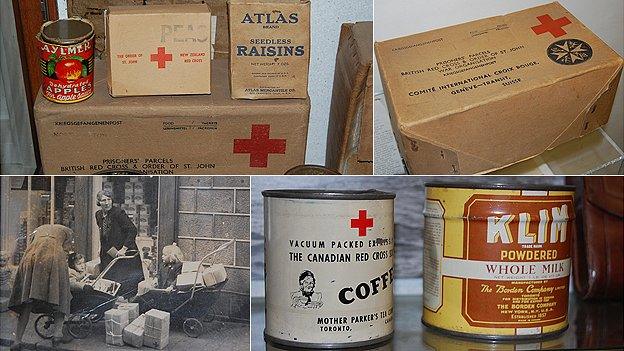
Each parcel was expected to last a person a month with specific packages for young children and babies
Guernsey resident Tom Jehan described the situation: "Every available piece of ground at our house was used for growing vegetables, even the front lawn became a cabbage patch.
"Some of the 'delicacies' were carrageen moss to make a jelly or blancmange, sweet corn ground into flour to make cakes, bramble-leaf tea, parsnip coffee [and] fried potato peelings."
"Many are in a very poor condition, so the extra reduction in food values will have a serious consequence for them," said Dr Robert Noel McKinstry, Jersey's medical officer of health, in August following the announcement of further rationing.
On 5 November, the bailiff of Guernsey was given permission by the military authorities to send details of the desperate situation in Guernsey, Sark and Herm to the International Red Cross. A similar report was sent by Jersey's bailiff a few days later.
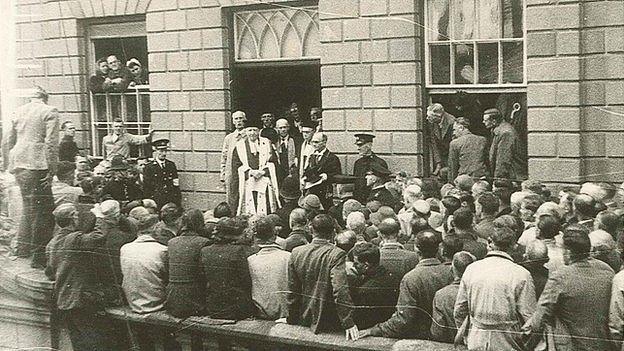
Guernsey Bailiff Victor Carey addressing islanders on VE Day, a day before the island was liberated

Letter from the bailiff of Guernsey to the secretary general of the International Red Cross
Conditions rapidly deteriorating here. Will soon become impossible. We appreciate difficulties, but civilian population need urgent supplies of essentials. We urge immediate visit of Red Cross Representatives.
All rations drastically reduced. Bread finishes December 15th. Sugar finishes January 6th. Fat production much below subsistence levels. Ration of mild reduced to one third of a point per head by the end of the year. Soap and other cleaners, stocks completely exhausted. Vegetables generally inadequate to supply civilian population, through the winter.
German consumption heavy. Salt exhausted. Clothing and footwear stock almost exhausted. Fuel, gas and electricity finish end of year. Coal stocks exhausted. Wood fuel inadequate. Many essential medical supplies finished.
(Signed) Victor G. Carey, Bailiff of Guernsey

On 9 November, the UK Home Office suggested the Joint War Organisation (JWO) of the British Red Cross and Order of St John take action to help islanders.
The Vega left Lisbon on 20 December, carrying food parcels and diet supplements for the sick. The ship arrived in Guernsey on 27 December and in Jersey on 31 December.
Herbert Nicholls described the ship's arrival: "There was rumours all the time and there was talk of a ship coming, then it arrived, and it was there with the big red cross on, red and white.
"That was the excitement, everybody was waiting for their Red Cross parcels."

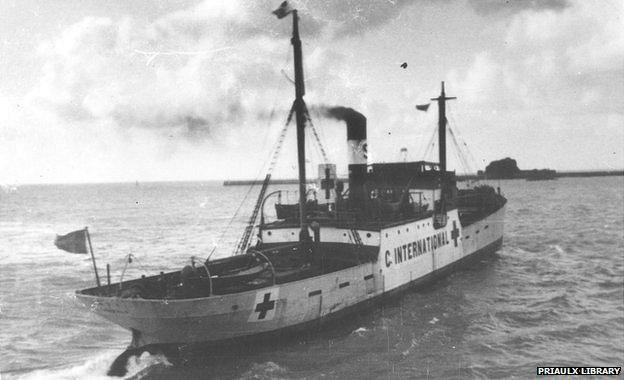
SS Vega made seven trips to the islands from December 1944 to June 1945
On its first visit SS Vega delivered to the islands:
119,792 standard food parcels
4,200 diet supplement parcels for the ill
5.2 tons of salt
Four tons of soap
96,000 cigarettes
37 cwt medical and surgical supplies (equivalent to 1,850kg or 3,700lb)
A small quantity of clothing for children and babies

Alfred Roussel summed up the feelings of many islanders: "That name, Vega will always dwell in the minds of those who were in the island at that time as the turning point in the food situation."
The Vega visited the islands six more times with the last being about a month after the islands had been liberated in May 1945, but before a regular ferry service was reinstated and the return of the many evacuees.
Mr Jehan said of one of the later deliveries: "Everybody commented on how white the bread was, it was such a change as the bread we had been accustomed to was made with oatmeal, husks and all."

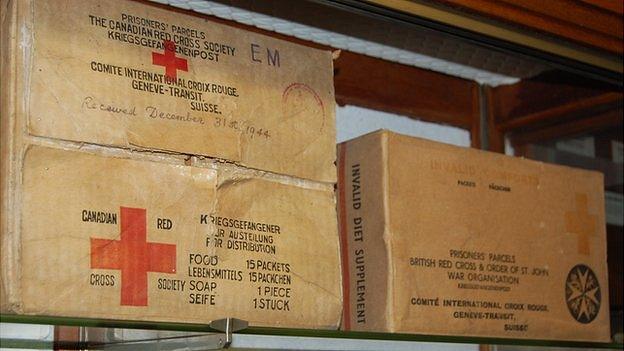
Red Cross parcels
The Canadian parcels contained:
5oz Chocolate, 12oz Biscuits, 3oz Sardines, 16oz Milk powder, 6oz Prunes, 8oz Salmon, 12oz Corned beef, 7oz Raisins, 8oz Sugar, 4oz Tea, 4oz Cheese, 16oz Marmalade, 16oz Butter, 10oz Spam, 3oz Soap and 1oz Pepper and salt
And the parcels from New Zealand held:
4oz Tea, 16oz Corned mutton, 12oz Lamb and green peas, 6oz Chocolate, 16oz Butter, 16oz Coffee and milk, 6oz Sugar, 7oz Peas, 14oz Jam, 16oz Honey, 12oz Cheese and 6oz Raisins

The Red Cross had also been involved in delivering vital medical supplies to the island with medicines, drugs and medical stores sent from 1942 onwards.
This included some individual requirements including a surgical boot for an elderly woman, a new truss for a man, special powders for a man who had been badly gassed in World War One and new equipment for a radiologist.
- Published8 December 2014
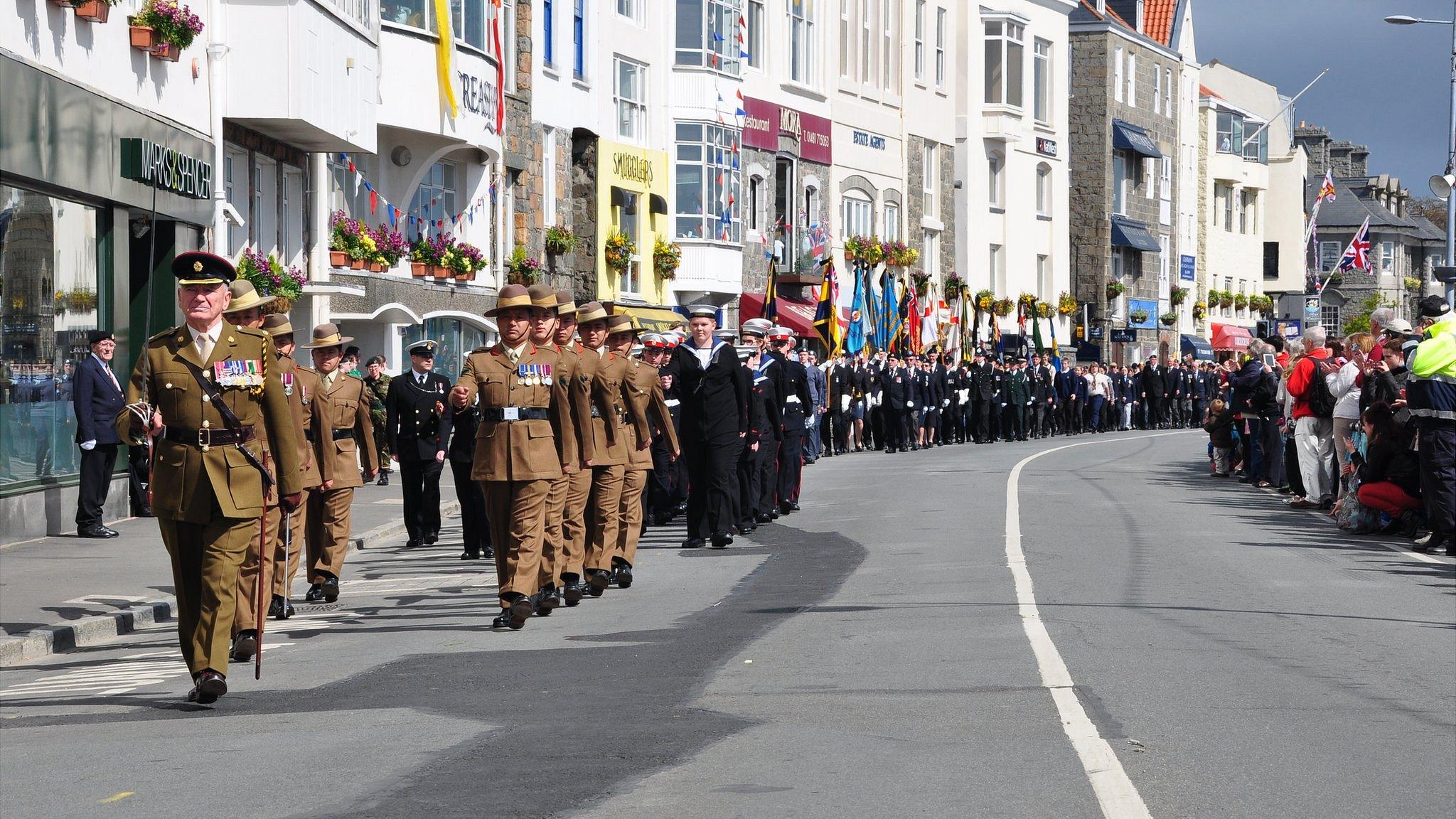
- Published6 December 2014
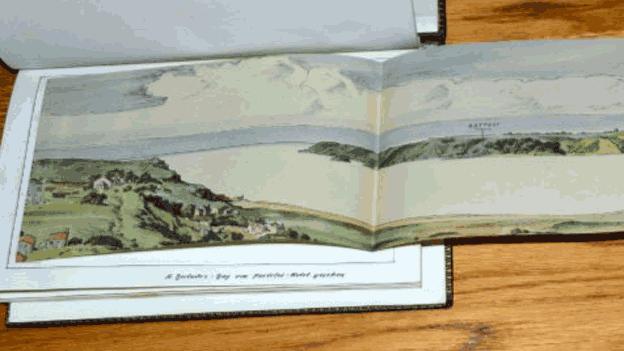
- Published20 October 2014

- Published3 October 2014
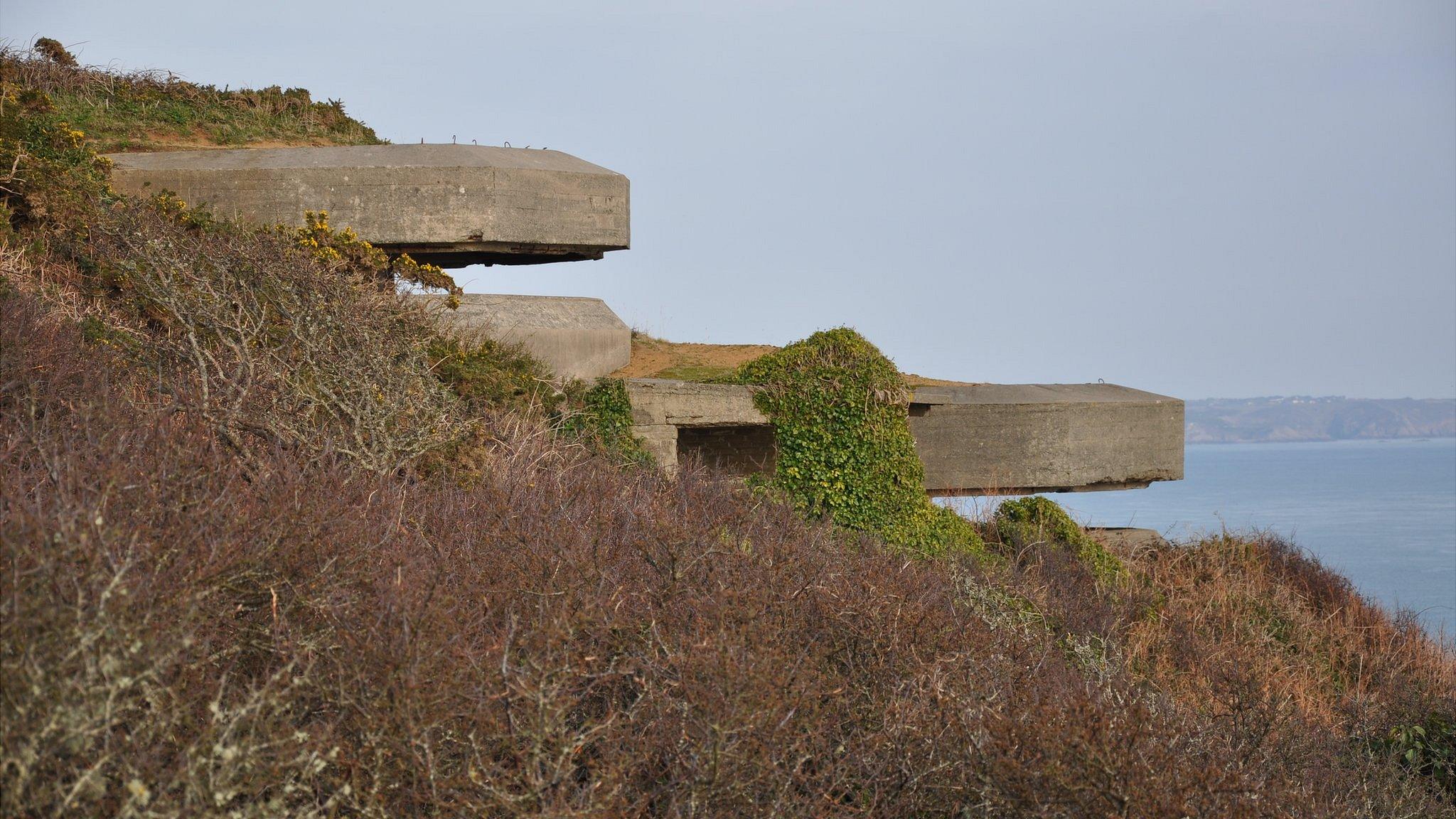
- Published3 October 2014
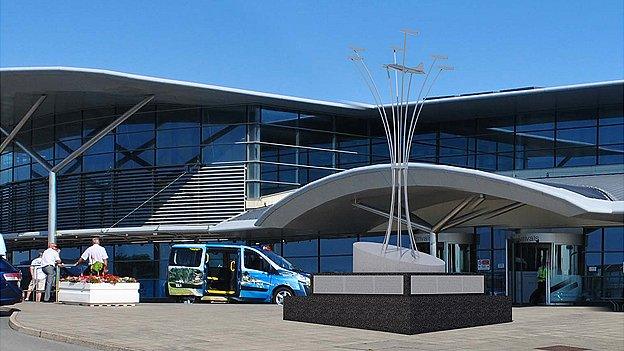
- Published20 August 2013
